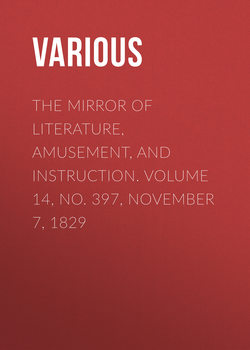Читать книгу The Mirror of Literature, Amusement, and Instruction. Volume 14, No. 397, November 7, 1829 - Various - Страница 5
Burleigh, Northamptonshire
ANCIENT HISTORY OF DRURY LANE
Оглавление(For the Mirror.)
The reader will most probably exclaim, "Ancient History of Drury Lane! What a farce!" A dirty lane filled with all complexions of hawkers and pedlars, licensed and unlicensed!—true incurious reader, Gay has sung
"Of Drury's mazy courts and dark abodes;"
yet the topographical and theatrical loiterer may call to mind many pleasing reminiscences, although mingled with unpleasing ones:
"Who has not here a watch or snuff-box lost,
Or handkerchiefs that India's shuttle boast."
GAY.
Stowe says, "Drury Lane, so called, for that there is a house belonging to the family of the Druries.1 This lane turneth north towards S. Giles in the field. From the south end of this lane in the high street, are divers faire buildings, hostelries, and houses for gentlemen, and men of honor, &c."
Nightingale tells us, "The west end of Wych Street was formerly ornamented by Drury House, built by Sir William Drury, an able commander in the Irish wars, in the reign of Queen Elizabeth, and who unfortunately fell in a duel with Sir John Burroughs, through a foolish quarrel about precedency. During the time of the fatal discontents of Elizabeth's favourite, the Earl of Essex, it was the place where his imprudent advisers resolved on such counsels, as terminated in the destruction of him and his adherents. In the next century it was possessed by the heroic Earl of Craven, who rebuilt it. It was lately a large brick pile, concealed by other buildings and was a public-house, bearing the sign of the Queen of Bohemia's Head, the earl's admired mistress, whose battles he fought animated by love and duty. When he could aspire to her hand, he is supposed to have succeeded, and it is said, that they were privately married; and that he built for her the fine seat at Hampstead Marshal, in the county of Berks, afterwards destroyed by fire. The services rendered by the earl to London, his native city, in particular, were exemplary. He was so indefatigable in preventing the ravages of the frequent fires of those days, that it was said his very horse smelt it out. He and Monk, Duke of Albemarle,2 heroically staid in town during the dreadful pestilence, and at the hazard of their lives preserved order in the midst of the terror of the times." The house was taken down, and the ground purchased by Mr. Philip Astley, who built there the Olympic Pavilion. In Craven Buildings there was formerly a very good portrait of the Earl of Craven in armour, with a truncheon in his hand, and mounted on his white horse. The Theatre Royal in this street, originated on the Restoration. "The king made a grant of a patent (says Pennant) for acting in what was then called the Cockpit, and the Phoenix, the actors were the king's servants, were on the establishment, and ten of them were called gentlemen of the Great Chamber, and had ten yards of scarlet cloth allowed them, with a suitable quantity of lace."
There is a curious specimen of ancient architecture at the sign of the Cock and Magpie public-house, facing Craven Buildings. Smith, in his London, says, "The late Mr. Thomas Batrich, barber, of Drury Lane, (who died in 1815, aged 85 years,) informed me that Theophilus Cibber was the author of many of the prize-fighting bills, and that he frequently attended and encouraged his favourites. It may be here observed, that Drury Lane had seldom less than seven fights on a Sunday morning, all going on at the same time on distinct spots." At present, the fights are between the apple-women and the dogberries, respecting the legal tenure of stalls:
"Bess Hoy first found it troublesome to bawl,
And therefore plac'd her cherries on a stall."
KING.
Drury Lane will always be interesting to the theatrical loiterer, from the number of stars that have irradiated from its horizon. If the wise Solon had lived in our times, he would no doubt have felt a local attachment to this neighbourhood; for he frequented plays even in the decline of life. And Plutarch informs us, he thought plays useful to polish the manners, and instil the principles of virtue.
P.T.W.
1
Dr. Donne resided in a house of Sir R. Drury. Vide Life by honest Izaak Walton.
2
He married a daughter of one of the Fine Barber-women of Drury Lane.
